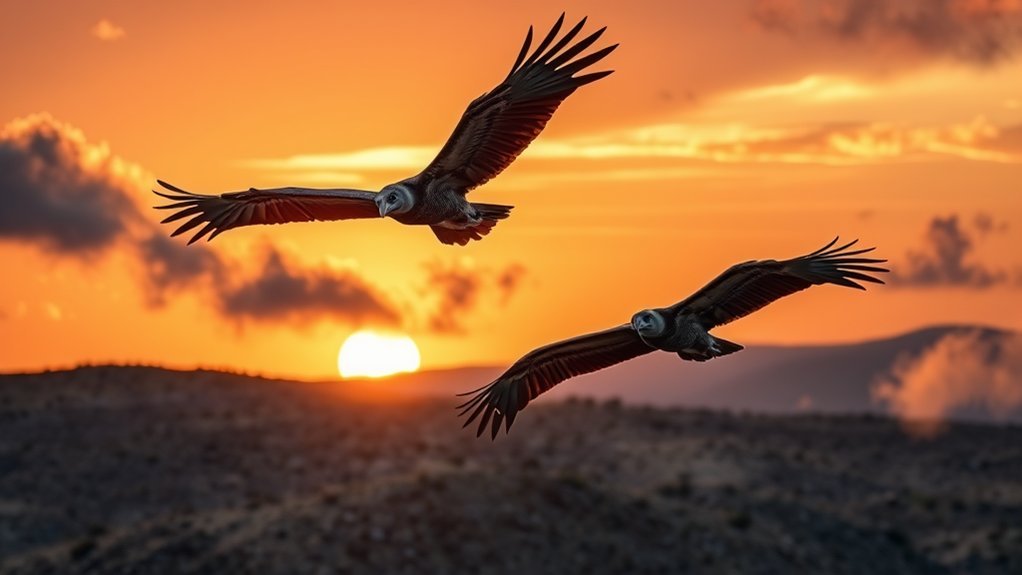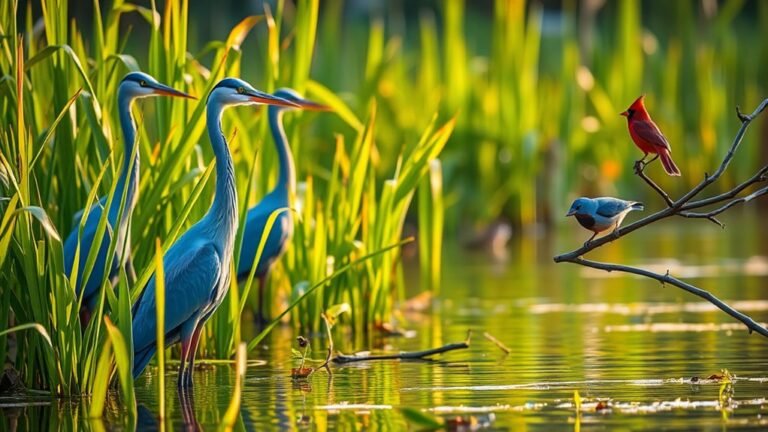Vulture-Like Birds: Scavengers of the Sky
When you see vultures flying in the sky, remember their important role in our environment. These birds are scavengers. They have sharp eyesight and special features that help them. Vultures keep nature in balance. They control disease and recycle nutrients, often without us noticing. If their numbers decrease, it can harm the ecosystem. The question arises: what will happen if these vital cleanup crews disappear? Who will face the impact?
Key Takeaways
Vulture-like birds play an essential role as scavengers. They eat dead animals, which helps stop disease spread and keeps ecosystems balanced.
These birds have special features. They can see well from great distances and their strong stomachs help them digest carcasses. Their social habits also manage the populations of other scavengers, ensuring that resources remain available.
In many cultures, people view vultures as symbols of change, renewal, and ecological balance.
Conservation efforts are important because vulture populations are declining. These efforts include raising public awareness and protecting their habitats.
Understanding Vulture-Like Birds

Vultures play a crucial role in nature. They're scavengers, which means they eat dead animals. This helps keep the environment clean by removing waste. In doing so, vultures help prevent diseases from spreading.
Many people see vultures in a negative light, but their presence is necessary for a healthy ecosystem. They symbolize transformation and renewal, highlighting their importance in the cycle of life.
By understanding vultures better, we can appreciate their role in biodiversity. Recognizing their value helps us feel more connected to nature.
Vultures remind us of the delicate balance that supports all living things.
The Role of Vultures in Ecosystems
Vultures play a vital role in ecosystems. They aren't just scavengers; their actions help maintain balance in nature. By consuming dead animals, vultures stop diseases from spreading. This makes them nature's clean-up crew. Their work supports biodiversity by ensuring nutrients are recycled effectively.
Without vultures, ecosystems can face problems. Disease-carrying pests may increase, and nutrients can build up in the environment. Understanding vultures' importance helps us appreciate nature's balance and encourages their conservation.
Recognizing vultures as crucial players reminds us of our connection to the natural world. Their presence supports healthy ecosystems, showcasing how every species contributes to overall environmental health.
Anatomy Adaptations for Scavenging

Vultures have special features that help them scavenge for food. Their long wings and light bodies let them fly high in the sky and travel far distances. This ability helps them find food from miles away. Vultures also have sharp eyesight to see carcasses quickly.
Their digestive systems are strong and acidic, which allows them to eat rotten meat that might be unsafe for other animals. Additionally, vultures have bald heads. This lack of feathers helps them stay clean because they can easily wash off any dirt after eating.
These features help vultures survive. They play an important role in the ecosystem by cleaning up dead animals. Their adaptations ensure that they remain effective scavengers and contribute to environmental balance.
Species of Vulture-Like Birds
Vulture-like birds are interesting scavengers with important roles in nature. The Turkey Vulture has a strong sense of smell that helps it find dead animals easily.
The Griffon Vulture can soar high and travel far to locate food. The Black Vulture is known for its bold searching methods, showing different ways these birds survive.
Each vulture species contributes to keeping the environment clean. Learning about these birds helps us understand their significance and their connection to the ecosystem of scavengers in the sky.
Vulture Behavior and Social Structures

Vultures show interesting behaviors and social structures. These birds don't only scavenge alone; they often come together in groups.
When vultures gather in flocks, they demonstrate clear dynamics. Each bird has a role, and there are social rankings among them. Dominant vultures usually help find food for the group.
Their interactions mix cooperation and competition. This balance helps build a sense of community.
Vultures roost together, which strengthens their social bonds and improves communication. By observing these behaviors, you can see how social structures are important for their survival and success.
The Feeding Habits of Vulture-Like Birds
Vulture-like birds have unique feeding habits crucial for their survival. They choose carcasses carefully, using sharp eyesight to find the freshest remains.
These birds often wait for other scavengers to start eating before they approach. This strategy helps them access nutrient-rich meat while reducing competition.
They usually feed in groups, which offers protection and supports efficient feeding. In these groups, there's a clear hierarchy; dominant birds eat first.
These feeding habits show the important role of vulture-like birds in their ecosystems. They help maintain balance in nature while ensuring their survival.
Vultures and Disease Prevention
Vultures are vital in preventing disease in their ecosystems. They eat decaying carcasses, which could spread harmful germs.
By scavenging, vultures help remove potential disease sources, improving the health of other scavengers and the overall ecosystem. Their digestive systems can handle bacteria and toxins that are dangerous to most animals. This ability protects vultures and lowers the risk of disease spreading to other wildlife and humans.
Mythology and Folklore Surrounding Vultures
Vultures are often seen as scavengers, but many cultures attribute significant symbolism to these birds. In ancient Egypt, vultures represented protection and were linked to motherhood and nurturing. Their role in cleaning the environment led to their image as guardians in various belief systems.
In Native American folklore, vultures serve as symbols of transformation, embodying change and renewal. Each culture adds to the understanding of vultures, revealing deeper meanings beneath their scavenger label.
These stories encourage us to recognize the important roles vultures play in our world. They remind us that even creatures that may seem unappealing can be filled with beauty and significance.
The Importance of Conservation
Conservation is vital for keeping our ecosystems healthy, and vultures play a key role in this system. These incredible birds help control diseases by eating dead animals, which stops potential outbreaks.
Sadly, their numbers are declining, making conservation efforts crucial.
You can help by supporting local and global initiatives aimed at protecting these important scavengers. Awareness campaigns educate people about the vital role vultures play in the environment and how their decline can impact us all.
Joining community projects creates a sense of connection among people who care about conservation.
By supporting vultures and participating in these efforts, you help protect wildlife and maintain the health of our environment for future generations.
Together, we can make a difference.
Threats to Vulture Populations
Vultures are important for keeping ecosystems healthy, but their populations are facing serious threats. Here are three key issues:
- Habitat Loss: Urban development is reducing the places where vultures can live, find food, and nest.
- Poisoning: Farmers sometimes use harmful chemicals to manage livestock diseases, which can poison vultures that eat the affected animal carcasses.
- Direct Persecution: In some areas, people see vultures as a nuisance and harm them intentionally.
These problems harm vulture populations, making it important to recognize and address their struggles.
Vultures in Different Cultures
Vultures are important in many cultures around the world. They symbolize change and renewal.
In Native American beliefs, vultures act as protectors of the Earth. They help clean up decay and support the cycle of life.
In Hindu culture, vultures are part of funeral rituals. They show respect for the dead and help guide them to the afterlife.
In ancient Egyptian mythology, vultures symbolize motherhood and protection, highlighting a nurturing side.
These different views demonstrate how vultures connect to life, death, and our planet, fostering a sense of belonging.
The Impact of Vultures on Agriculture
Vultures play a vital role in agriculture. They help keep ecosystems healthy through their scavenging habits. Here are some key benefits of vultures for farming:
- Disease control: Vultures eat decaying animals. This reduces the spread of diseases and keeps livestock healthier.
- Nutrient recycling: Their feeding helps break down organic matter. This process enriches the soil and supports plant growth.
- Pest reduction: Vultures keep other scavengers, like rodents, under control. This decreases crop damage.
Without vultures, farms could face serious challenges. Understanding their importance helps us appreciate these natural cleaners and promotes a sustainable approach to agriculture.
Educational Efforts and Awareness
Vultures play an important role in agriculture and the ecosystem. Educating the public about these birds is essential. Targeted educational programs can help people understand vultures as nature's cleanup crew. These programs highlight their ecological importance and challenge harmful myths.
Awareness campaigns can focus on schools, communities, and social media. They encourage discussions about biodiversity and conservation. When people learn about vultures, they join a movement to protect them.
Promoting vulture conservation helps create an environment where these scavengers are respected and appreciated for their vital services. By supporting their conservation, we ensure a healthier ecosystem for all.
How You Can Help Vulture Conservation
How can you help vultures every day? Your choices matter for these vital scavengers. Here are three simple ways to get involved:
- Support Vulture Rehabilitation Programs: Volunteer or donate to groups that care for injured vultures. Your help can make a difference.
- Join Community Awareness Initiatives: Participate in local events that teach others about how vultures help our ecosystems and support biodiversity.
- Advocate for Protection Policies: Talk to your local representatives about the importance of laws that protect vultures and their habitats. Your voice can lead to change.
Your actions can play a key role in vulture conservation.
Together, we can ensure a safer future for these important birds.
Frequently Asked Questions
How Do Vulture Populations Affect Human Health?
Vulture populations are important for keeping ecosystems healthy. They eat dead animals, which helps reduce diseases like rabies and anthrax. This protects public health. By removing carcasses, vultures prevent outbreaks that could hurt communities and increase healthcare costs. Their presence can lead to cleaner environments and safer living conditions for people.
What Is the Lifespan of a Vulture in the Wild?
Vultures in the wild can live between 10 to 30 years. Their lifespan depends on the species and the environment they inhabit. Watching vultures in their natural habitats shows how they adapt to different challenges. This observation can help you appreciate their strength and survival skills.
Can Vultures Recognize Each Other Individually?
Yes, vultures can recognize each other as individuals. This ability helps them maintain their social structure. By recognizing one another, they can form bonds and interact effectively within their groups. This social recognition is important for their survival and cooperation.
What Adaptations Help Vultures Locate Carcasses From the Air?
Vultures locate carcasses from the air using two main adaptations. First, they utilize thermal updrafts to glide effortlessly. This ability allows them to cover large areas with minimal energy. Second, their sharp eyesight enables them to detect small signs of decay from great distances. These adaptations make vultures highly effective scavengers in the ecosystem.
Do Vultures Migrate or Are They Resident Birds?
Vultures can be classified as either migrants or residents. Some species migrate seasonally to find food, while others stay in one place throughout the year. These resident vultures adapt to their local environments and use available resources for survival. Understanding their behavior helps us appreciate their role in the ecosystem.

Ava is a bird enthusiast and nature lover who has spent countless hours observing and learning about the fascinating world of birds. With a passion for sharing her knowledge and inspiring others to appreciate the beauty of birds, Ava writes about her experiences and insights on avianadmirer.com.







